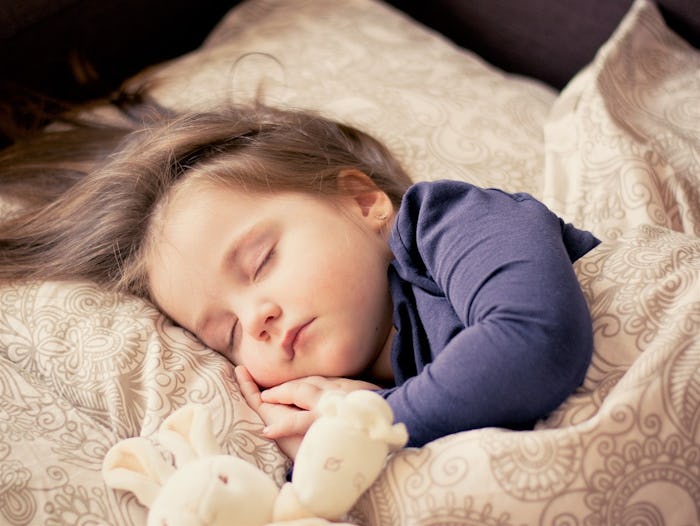Were you looking for a good reason to send your preschooler to bed early other than chardonnay and Netflix? Well, it turns out sending your sleepy tot to bed on time isn't just good for you (which it totally, completely is), but it's also good for your child. A recent study suggests that a preschooler's early bedtime could help them in later years in an important way. So bring on the chardonnay.
The Journal of Pediatrics published a study called Bedtime in PreSchooled Children and Risk for Adolescent Obesity. According to the study, the preschoolers who went to bed before eight o'clock were less likely to become obese as adolescents. Half as likely to be obese as adolescents, to be specific. The study looked at approximately 1,000 families with preschoolers, whose average age was around four-years-old, and their bedtimes. The researchers noted that 25 percent of participants had bedtimes before eight o'clock, 50 percent had a bedtime between eight and nine o'clock, and 25 percent went to bed after nine o'clock. By the time the after-nine bedtime group turned 15-years-old, 23 percent of them were obese (according to their measured BMI), while less than 10 percent of children who went to bed before eight were obese at the same age.
According to Sarah Anderson, the lead author of the study and associate professor of epidemiology at the Ohio State University College of Public Health, the study could act as a reinforcement for parents.
“It’s something concrete that families can do to lower their child’s risk and it’s also likely to have positive benefits on behavior and on social, emotional and cognitive development."
Weight issues in children is a serious concern in the United States. The Center for Disease Control and Prevention reports that one in six children in America suffers from obesity. If a child becomes obese at a younger age, they could potentially struggle with health issues like diabetes and heart disease later in life.
Fortunately, if you have a preschooler at home there is still time to encourage them to go to sleep at an earlier hour. Sleep consultant Alanna McGinn recommends following these steps:
- Keep evenings simple
- Prepare meals ahead of time
- Appeal to your kid's common sense
- Start small
Remember that the average preschooler needs about 10-13 hours of sleep per night. And if you need any extra incentive to get your child off to bed, think about this:
You could be having a bath alone. You could read a book, alone. You could watch something with swear words in it.
Early bedtime is truly a win-win.
